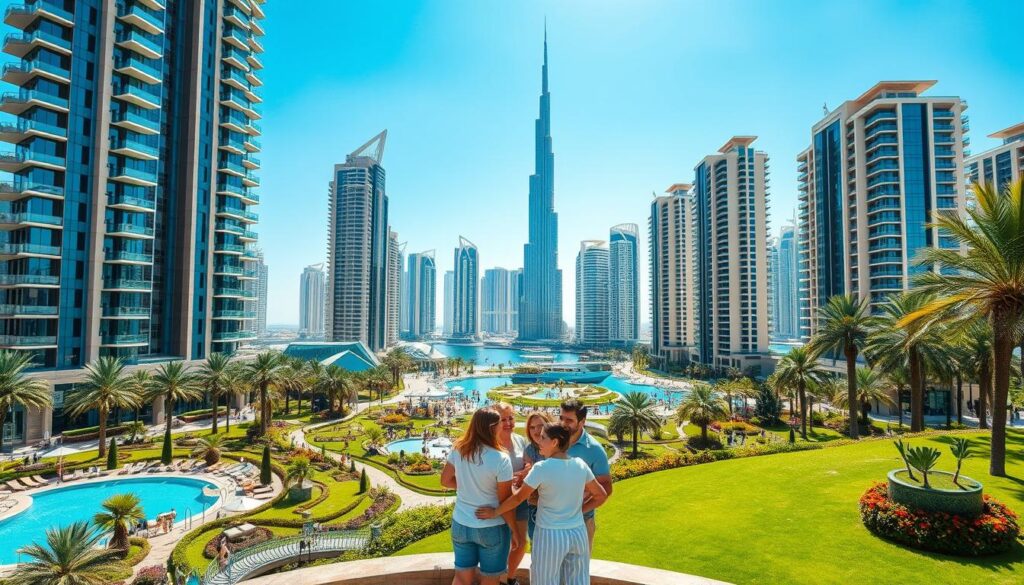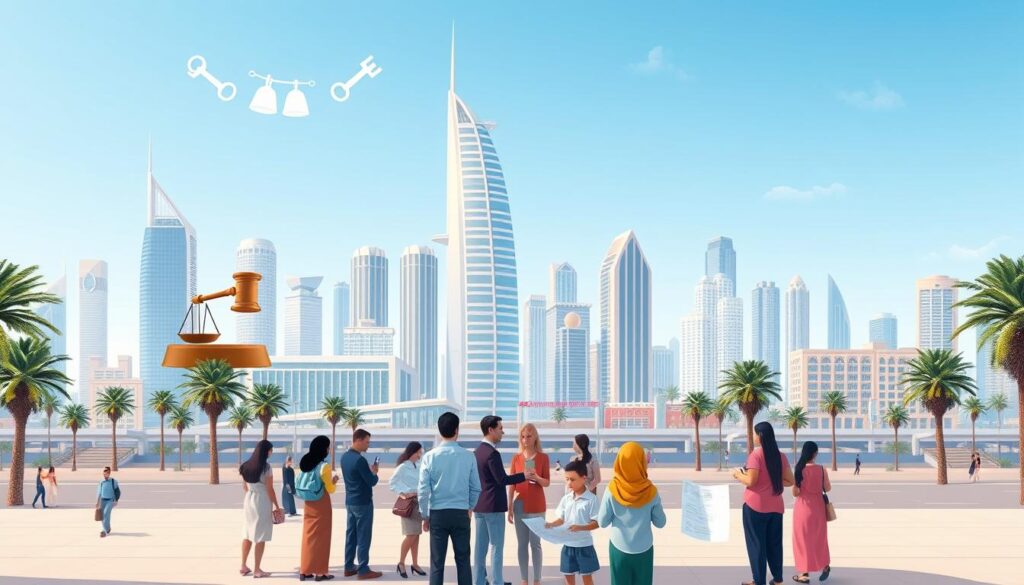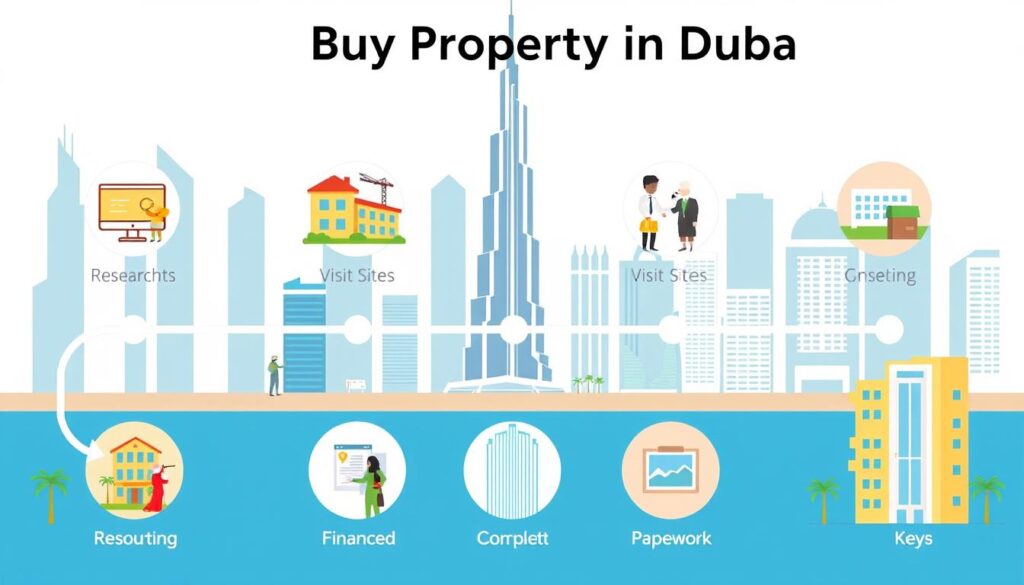Dubai’s real estate market is buzzing with opportunities for those wanting to buy freehold property. It has a unique legal setup and a wide range of properties. This guide helps clear up the mystery of owning freehold property, especially for foreign nationals.
Foreigners can own land and buildings in certain areas. The chance to own a piece of Dubai is exciting, with places like Al Barari, Business Bay, and Jumeirah Beach Residence. Knowing the legal aspects, procedures, and benefits of freehold property in Dubai is key.
Key Takeaways
- Freehold property ownership allows foreign investors to own land and buildings in designated areas in Dubai.
- There are various options available, including residential, commercial, and luxury developments.
- Understanding the legal framework, governed by Law No. 7 of 2006, is crucial for successful transactions.
- Dubai offers appealing visa benefits for property owners, such as the Golden Visa and Investor Visa.
- Research and due diligence help in navigating the real estate market effectively.
- Professional legal advice is recommended to ensure compliance with Dubai’s regulations.
Understanding Freehold Property Ownership
Freehold property ownership in Dubai lets expats own real estate without any limits. This means they have full control over their property. They can sell, lease, live in, and pass it down to others. Many see this as a great chance for long-term investments in Dubai’s growing real estate market.
Since 2001, Dubai has made it easier for foreigners to own property. The Freehold Decree opened up areas for foreign buyers. Now, anyone 21 or older can buy freehold properties, no matter their nationality.
There are many benefits to owning freehold property. Property values can go up over time, especially in Dubai. The market is strong and the economy is thriving. You can choose from many types of properties, like flats, villas, and commercial spaces. Plus, you can earn a lot of money from renting it out.
It’s important to know your rights as a property owner. Do your homework and get legal help to avoid problems. Also, consider hiring a property management service. They can help you follow the rules and take care of the day-to-day tasks.
Legal Framework of Freehold Properties
The legal rules for freehold properties in Dubai started with the Freehold Decree, Law No. 7 of 2006. This law lets foreign nationals and expats, who are 21 or older, buy, sell, and own properties in certain areas. Today, over 70 freehold areas offer many investment choices.
The Dubai Land Department is key in handling property deals. It makes sure everything is clear and keeps records up to date. This helps protect property rights and gives out title deeds to prove ownership.
Leasehold properties, however, go back to the owner after 99 years. Dubai’s laws help buyers feel secure. Buying freehold properties is easier, needing less paperwork and no state approval.
The Real Estate Regulatory Agency (RERA) was set up by Dubai Law No. 16 of 2011. RERA looks after the real estate world. It helps solve problems with property rights and tenancy. The rules around freehold properties make Dubai a great place for investing in property.
Types of Freehold Properties
Dubai offers a wide range of freehold properties. These include homes and business spaces. They meet different needs and investment goals.
Residential Units
Dubai has many residential options. You can find apartments, villas, townhouses, and penthouses. Emaar has developed famous areas like Downtown Dubai and Dubai Marina.
- Downtown Dubai: Stunning views, modern architecture, and attractions like the Burj Khalifa.
- Dubai Marina: High-rise apartments with marina views and lively nightlife.
- Arabian Ranches: Family-friendly community with villas and golf course access.
- Bluewaters Island: Luxury apartments with sea views near the world’s largest observation wheel.
Commercial Spaces
Commercial freehold properties offer various options. You can find office spaces, retail outlets, and large commercial buildings. Business Bay is a prime location with advanced facilities for businesses.
| Type of Property | Features | Example Areas |
|---|---|---|
| Residential Freehold Properties | Apartments, villas, townhouses, penthouses | Downtown Dubai, Dubai Marina, Al Barari |
| Commercial Freehold Properties | Office spaces, retail stores, commercial buildings | Business Bay, Dubai Design District |
| Mixed-Use Freehold Properties | Combines residential and commercial units | Jumeirah Lake Towers, Dubai Creek Harbor |
Benefits of Freehold Property Ownership
Investing in freehold property in Dubai offers many advantages. It’s perfect for smart investors and those looking for long-term gains. The real estate market here is booming, making it a great choice for your investment.
Investment Opportunities
The Dubai real estate market is a top pick for property investment. In 2023, over 100,000 real estate deals were made. This is a 37% jump from the year before, with total values hitting AED 300 billion.
Freehold properties are in high demand, making up 68% of all transactions. This shows investors have a lot of faith in Dubai.
- Average residential property prices went up by about 7% in a year, reaching AED 1,708 per square foot for apartments.
- Rental yields average between 8% and 10%. Dubai offers better returns than cities like London and New York.
- There are no property taxes, which means investors get to keep more of their earnings. This is a big plus in the real estate world.
Visa Benefits
Freehold property ownership in Dubai opens up visa options for investors and their families. Buying property worth AED 750,000 or more makes you eligible for a renewable UAE residence visa. This makes it easier to live and invest in the UAE.
- The Dubai Golden Visa program lets property investors get long-term residency with investments starting at AED 50,000.
- Investor visas are available for 5-Year and 10-Year periods, depending on the investment amount. This gives people more options.

Freehold property ownership also gives inheritance rights. This means you can pass on your assets to your heirs. It also means no annual ground rent or usage restrictions, giving investors more freedom and peace of mind.
How the Buying Process Works
The property buying process in Dubai starts with a thorough search in freehold areas. Buyers can use Emaar’s website or real estate agents to find properties. It’s crucial to check the property’s legal status and ensure there are no disputes.
Property Search and Due Diligence
When searching for properties in Dubai, look at areas like Arabian Ranches and Downtown Dubai. These places offer great features and freehold ownership. It’s important to do detailed research on the property’s history and legal documents.
- Reviewing property history and legal documents.
- Confirming the ownership claims and encumbrances.
- Inspecting the physical condition and compliance with local regulations.
This step helps buyers make a smart choice before moving forward.
Transaction Completion
After choosing a property, negotiations and a sales agreement are drafted. Buyers must consider their budget and mortgage options. Once agreed, both parties sign the purchase agreement.
Then, buyers pay deposits and fees. The Dubai Land Department issues a title deed, proving ownership. For more on buying property in Dubai, see this comprehensive guide.
Legalities and Regulations
Understanding the laws around freehold property in Dubai is key for investors. The rules set by property laws and the Dubai Land Department make buying safe and clear. These laws help keep the process fair for both local and international buyers.
Property Registration
The Dubai Land Department is crucial in recording property deals. Every transaction is carefully documented, showing who owns what. This helps protect buyers’ rights, especially for freehold properties.
As part of the rules, buyers get title deeds. These documents prove their ownership, making the process secure.
Escrow Accounts
For off-plan property, money goes into escrow accounts run by the Dubai Land Department. This keeps funds safe until the developer finishes the project. It’s a way to protect investors, making them feel more secure.

Key Considerations for Prospective Buyers
When looking to buy property, it’s key to know the difference between freehold and leasehold. Freehold properties mean you own the land and the building. This is great for those who want to hold onto their investment for a long time. On the other hand, leasehold properties have a 99-year lease and return to the owner after it ends.
It’s important to watch Dubai’s market trends, especially in areas like Downtown Dubai and Dubai Marina. Freehold properties in these spots can grow in value over time. Leasehold properties, however, are cheaper upfront, making them a good choice for first-time buyers or those with less money.
Working with a good real estate agent is crucial. They can guide you through the legal side of buying a property. They also help make sure you follow Dubai’s rules. Knowing what’s around your property and the amenities it offers is also important for making a smart choice.
Before choosing a property, think about what you want from your investment. Freehold properties give you full control and ownership. Leasehold properties share maintenance costs with the freeholder. Your choice can affect how much your property is worth and your overall investment experience.
| Property Type | Ownership Duration | Investment Potential | Management Responsibility |
|---|---|---|---|
| Freehold | Indefinite | Higher ROI potential | Full responsibility for maintenance |
| Leasehold | 10 to 99 years | Affordable entry with potential tenancy | Managed by freeholder or property management |
Buy Freehold Property in Dubai
Buying freehold property in Dubai requires several steps for a smooth process. Foreigners over 21 can buy freehold property, a right given by a decree in 2002. This ownership means full rights over the property and land, unlike leasehold properties.
First, find the area you want to buy in. Popular spots include Downtown Dubai, Dubai Marina, Jumeirah Village, and Palm Jumeirah. Research these areas well, looking at price, amenities, and growth potential.
After picking a property, work with a trusted real estate agent or lawyer. Good communication and proper documents are key. You’ll need a No Objection Certificate from the Dubai Land Department (DLD) to start.

With the No Objection Certificate, you can move to the transfer phase. This includes signing the sale agreement and preparing legal documents. Finally, register the new title deed with the DLD to complete the transfer. Buying freehold property in Dubai offers long-term benefits, like renewable UAE visas for property owners and their families.
| Considerations | Freehold Property | Leasehold Property |
|---|---|---|
| Ownership Type | Absolute ownership of property and land | Ownership for a fixed term (up to 99 years) |
| Eligibility for Foreign Nationals | Allowed since 2002 | Allowed since 2001 |
| Average Sales Price | Generally higher | Typically lower |
| Popular Areas | Downtown Dubai, Dubai Marina, Palm Jumeirah | Deira, Bur Dubai, Dubai Silicon Oasis |
| Visa Benefits | Renewable UAE residence visas available | No specific visa benefits |
Conclusion
Investing in freehold property in Dubai opens up many opportunities, especially for overseas buyers. Since 2002, expats can own freehold property, just like in the USA or UK. This means they have full control over their property, making Dubai a great place for real estate.
There’s a wide range of freehold properties to choose from, like fancy villas and apartments by the water. Buying property here can even lead to residency, like a three-year visa for properties worth AED 750,000. With prices expected to rise, investing in Dubai’s freehold properties looks even more appealing.
Before diving into Dubai’s market, it’s important to research well. Look into rental yields and the costs of owning property. With the right information and advice, investors can make the most of Dubai’s real estate. This can lead to good returns and stability.
FAQ
What is freehold property ownership in Dubai?
How can foreign nationals purchase property in Dubai?
What types of freehold properties are available in Dubai?
What are the investment benefits of buying freehold property in Dubai?
What are the visa options available when owning property in Dubai?
What steps are involved in the property buying process in Dubai?
What are escrow accounts, and why are they important?
How does the registration process work for freehold properties?
What market trends should prospective buyers consider when purchasing property in Dubai?
Are there any legal complexities involved in buying freehold property in Dubai?
Source Links
- https://www.propertyfinder.ae/blog/dubai-freehold-property-guide/ – Your Piece of Paradise – Guide to Freehold Property in Dubai
- https://properties.emaar.com/en/blog/comprehensive-guide-to-freehold-property-ownership-in-dubai/ – Comprehensive Guide to Freehold Property Ownership in Dubai | Emaar Properties
- https://www.sobharealty.com/media-center/blogs/dubai-freehold-property-what-you-need-to-know/ – Dubai Freehold Property: What you Need to Know | Sobha Realty
- https://www.bayut.com/mybayut/freehold-property-ownership-laws-dubai/ – An Overview of Freehold Property Ownership Laws in Dubai – MyBayut
- https://sothebysrealty.ae/the-journal/freehold-properties-in-dubai/ – A Guide to Freehold Properties in Dubai
- https://www.linkedin.com/pulse/understanding-freehold-leasehold-property-laws-dubai-chattree-gjqbc – Understanding Freehold and Leasehold Property Laws in Dubai
- https://www.bhomes.com/en/blog/betterinformed/freehold-property-guide-dubai – Dubai freehold property guide.
- https://www.engelvoelkers.com/ae/en/resources/freehold-areas-in-dubai – Understanding Freehold areas in Dubai: Key Areas and Benefits
- https://aquaproperties.com/blog/top-10-reasons-to-buy-freehold-properties-in-dubai-2024 – Top 10 Reasons to Buy Freehold Properties in Dubai 2024
- https://www.samanadevelopers.com/blogs/why-owning-a-freehold-property-in-dubai-is-like-owning-a-piece-of-paradise – Samana Developers – Why Owning a Freehold Property in Dubai is Like Owning a Piece of Paradise?
- https://www.bayut.com/mybayut/legal-steps-buying-property-dubai/ – Your Step-by-Step Guide to Buying Property
- https://www.dubaihousing-ae.com/post/how-to-buy-freehold-property-in-dubai/ – How To Buy Freehold Property In Dubai
- https://www.guestready.com/blog/buying-property-in-dubai/ – Buying property in Dubai: A 2024 guide for investors | GuestReady
- https://www.damacproperties.com/en/blog/dubais-game-changing-freehold-property-ownership-laws – Dubai’s Game-Changing Freehold Property Ownership Laws
- https://orchidhomesrealestate.com/freehold-property-ownership-dubai/ – Freehold Property Ownership in Dubai
- https://www.exclusive-links.com/media/uae-property-blog/buying-freehold-vs-leasehold-property-in-dubai-exploring-the-benefits/ – Buying freehold vs. leasehold property in Dubai | Exploring the benefits | Exclusive Links
- https://www.11prop.com/articles/freehold-property-vs-leasehold – Freehold vs Leasehold Property in Dubai: Pros & Cons
- https://www.propertyfinder.ae/blog/leasehold-vs-freehold/ – Leasehold vs Freehold Properties in the UAE
- https://www.bayut.com/mybayut/buying-leasehold-freehold-property-dubai/ – All About Freehold vs Leasehold Property in Dubai – MyBayut
- https://topluxuryproperty.com/blog/benefits-of-buying-freehold-property-in-dubai/ – Benefits of Buying Freehold Property in Dubai
- https://www.samanadevelopers.com/blogs/owning-freehold-property-in-dubai—factors-to-consider – Samana Developers – Owning Freehold Property in Dubai
- https://prostarrealty.org/blog/benefits-of-buying-freehold-properties-in-dubai/ – Benefits of Buying Freehold Properties in Dubai